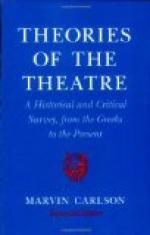II
By the word crowd, as it is used in this discussion, is meant a multitude of people whose ideas and feelings have taken a set in a certain single direction, and who, because of this, exhibit a tendency to lose their individual self-consciousness in the general self-consciousness of the multitude. Any gathering of people for a specific purpose—whether of action or of worship or of amusement—tends to become, because of this purpose, a crowd, in the scientific sense. Now, a crowd has a mind of its own, apart from that of any of its individual members. The psychology of the crowd was little understood until late in the nineteenth century, when a great deal of attention was turned to it by a group of French philosophers. The subject has been most fully studied by M. Gustave Le Bon, who devoted some two hundred pages to his Psychologie des Foules. According to M. Le Bon, a man, by the mere fact that he forms a factor of a crowd, tends to lose consciousness of those mental qualities in which he differs from his fellows, and becomes more keenly conscious than before of those other mental qualities in which he is at one with them. The mental qualities in which men differ from one another are the acquired qualities of intellect and character; but the qualities in which they are at one are the innate basic passions of the race. A crowd, therefore, is less intellectual and more emotional than the individuals that compose it. It is less reasonable, less judicious, less disinterested, more credulous, more primitive, more partisan; and hence, as M. Le Bon cleverly puts it, a man, by the mere fact that he forms a part of an organised crowd, is likely to descend several rungs on the ladder of civilisation. Even the most cultured and intellectual of men, when he forms an atom of a crowd, tends to lose consciousness of his acquired mental qualities and to revert to his primal simplicity and sensitiveness of mind.
The dramatist, therefore, because he writes for a crowd, writes for a comparatively uncivilised and uncultivated mind, a mind richly human, vehement in approbation, emphatic in disapproval, easily credulous, eagerly enthusiastic, boyishly heroic, and somewhat carelessly unthinking. Now, it has been found in practice that the only thing that will keenly interest a crowd is a struggle of some sort or other. Speaking empirically, the late Ferdinand Brunetiere, in 1893, stated that the drama has dealt always with a struggle between human wills; and his statement, formulated in the catch-phrase, “No struggle, no drama,” has since become a commonplace of dramatic criticism. But, so far as I know, no one has yet realised the main reason for this, which is, simply, that characters are interesting to a crowd only in those crises of emotion that bring them to the grapple. A single individual, like the reader of an essay or a novel, may be interested intellectually




